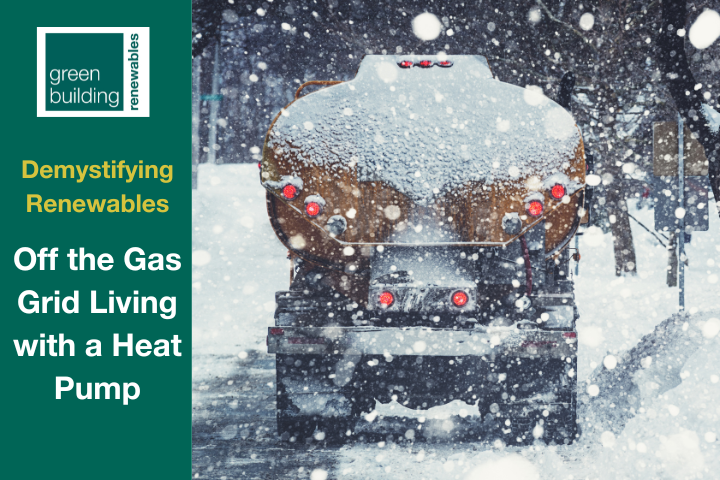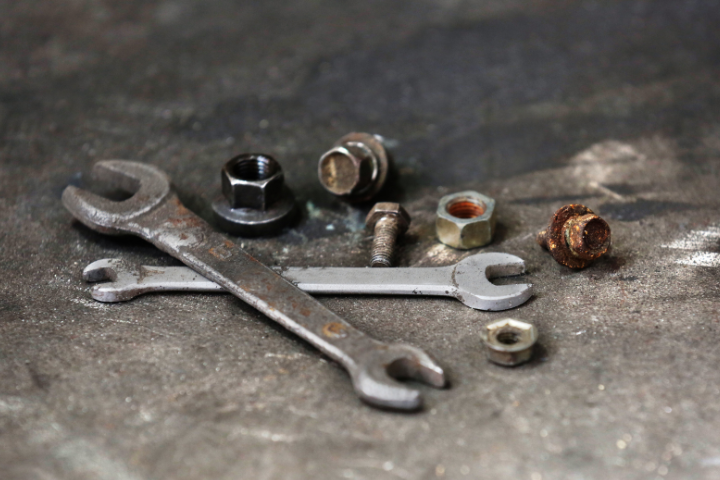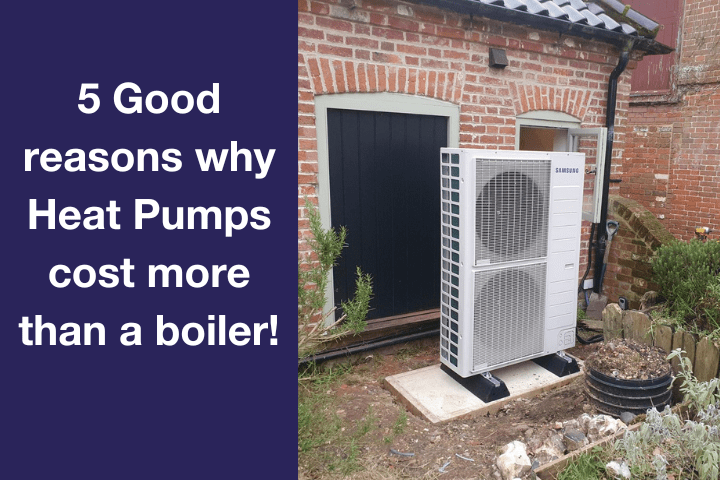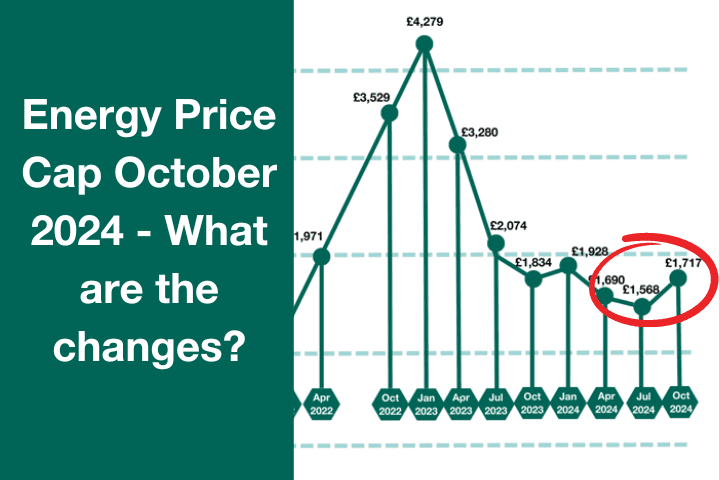Off Gas Grid Living: 10 ways a Heat Pump will make your life better and easier

Living off the gas grid in the UK and relying on fossil fuels like LPG (liquid petroleum gas) or oil for heating fuel presents several challenges.
Heating a home efficiently and sustainably with these fossil fuels in 2024 is difficult. Over the last few years, global events and the energy price crisis have severely affected the cost of traditional heating fuels like LPG and oil and made it even harder.
Many homeowners are now seeking alternative solutions to LPG and Oil heating, and one such solution is the adoption of heat pumps.
If you live off the grid and are considering installing a heat pump, this blog is for you. We’ll delve into the challenges faced by people in the UK living off the gas grid and highlight the benefits and reasons for how a heat pump could transform your home and lives for the better.
Table of Contents
What does Off the Gas Grid mean?
‘Off-grid’ living refers to a lifestyle where individuals or households are not connected to conventional utility grids, such as the electrical grid or natural gas supply. Sometimes, this can be a lifestyle choice; other times, it is because the utility infrastructure doesn’t exist for the property. ‘Off the gas grid’ refers to people in the UK who are not connected to a central gas supply.
How many people in the UK live off the gas grid?
In the United Kingdom, an estimated 4.4 million households are off the gas grid, meaning they do not have access to mains gas. Many of these homes rely on fossil fuel heating such as LPG or oil; others already use electricity.
The UK has the highest proportion of homes without a gas meter in the South West and Scotland, with 20% and 18%, respectively. Additionally, Inner London, the East of England, Wales, and Scotland each have significant percentages of households off the gas grid.
The North East and North West regions have the lowest proportions of off gas grid properties. Specific areas with fewer gas connections outside of London include West Wales, the Isles of Scilly, Anglesey, Cumbria, and rural parts of Norfolk and Suffolk. Rural areas, particularly in the UK, are more likely to be off the gas grid than homes in urban settings.
What are the challenges of living off the gas grid?
Living off the gas grid and heating your home with fossil fuels like LPG and oil poses several challenges for homeowners. Here are the main challenges:
Higher Costs:
Compared to mains gas, the average cost of heating a typical three-bedroom house is significantly higher with heating oil (around 50%) and even more with LPG (100%).
The cost of LPG and oil is also subject to significant fluctuations due to global oil prices and supply shortages. This can result in unpredictable energy bills, making budgeting for heating expenses more challenging. This has been a serious problem over the last few years.
Supply Delays and Reliability:
Unlike natural gas piped directly to homes through underground mains, LPG and oil require regular deliveries and on-site storage facilities. Coordinating fuel deliveries can be inconvenient, especially during periods of high demand or adverse weather conditions. Homeowners must also allocate space for storing bulky fuel tanks, which can be unsightly and take up valuable outdoor space.

LPG and oil deliveries can often be delayed. To make matters worse, this is more likely to happen when cold and extreme weather makes delivery to rural households more difficult. Such delays risk leaving homes without heating or hot water during subzero temperatures. Even when accounts are in credit, some customers experience fuel shortages. Oil deliveries may also face disruptions due to technical issues at refineries, impacting supply schedules.
Environmental Impact
LPG and oil heating systems are fossil fuel-based, emitting carbon dioxide (CO2) and other greenhouse gases when burned. This contributes to climate change and air pollution, adversely affecting local and global environments.
As concerns about sustainability and environmental responsibility continue to grow, the carbon footprint associated with LPG and oil heating is becoming increasingly problematic for many consumers.
Maintenance Requirements
LPG and oil heating systems require regular maintenance to ensure optimal performance and safety. This includes cleaning, servicing, inspecting equipment, and promptly addressing any repairs or malfunctions.

Neglecting maintenance can lead to reduced efficiency, increased fuel consumption, and potentially hazardous situations such as leaks or carbon monoxide emissions.
What are the ten benefits of switching from LPG or Oil heating to a heat pump?
- Cost Savings
There can be no argument about the savings on your heating costs for switching from LPG or oil heating to a heat pump.
If you have an LPG boiler operating at around 70% efficiency, switching to an air source heat pump could save you approximately 30% in annual heating costs. LPG prices can also be volatile, reaching peaks of nearly 90p per litre in 2022.
- More Efficient Heating for Your Home
Heat pumps capture heat from the outside environment and transfer it into your home. Although they use electricity to operate, the heat delivered is significantly greater than the electricity consumed. They are highly efficient.
Heat pumps typically operate at an average efficiency rate of at least 300%, with many working at even higher efficiency levels. This means they generate three units of heat for every unit of electricity they use.
Modern heat pump technology has advanced significantly, with options available for various property types and heating requirements. Whether it’s an air, ground, or water source heat pump, homeowners can find a solution tailored to their needs.
In comparison, LPG heating and Oil heating has an efficiency of 90%. Oil heating is slightly more efficient than LPG heating systems. However, the efficiency of both these systems is highly dependent on the age, condition and state of maintenance of the systems.
- Environmental benefits
Transitioning to a heat pump will immediately lower your carbon footprint. The environmental impact becomes even lower when combined with a renewable electricity tariff.
- No deliveries
Replacing an LPG or oil heating system removes the need to deliver either fuel to your home. This instantly removes the risk of your heating system being at the whim of delayed, cancelled, or inconvenient deliveries.
Without the need for deliveries of LPG or Oil, the risk of running out of fuel, and therefore heating, when needed, most likely during the cold or extreme weather, is removed.
- Improved Comfort and Air Quality:
Switching to a heat pump saves energy and enhances indoor air quality. Oil heating, in particular, can produce unpleasant smells for your home.
- Zero risk of Carbon Monoxide
With combustion systems like LPG and oil, there is always the risk of incomplete combustion and the dangerous gas carbon monoxide being produced.
Poorly maintained or malfunctioning oil heating systems may not burn fuel efficiently, leading to incomplete combustion.
An oil heating system can accumulate soot if it is not adequately cleaned or serviced. Soot buildup can hinder proper combustion and further increase the risk of carbon monoxide emissions.
Similarly, poor ventilation in the area where the oil heating system is installed can also lead to a buildup of carbon monoxide. Proper ventilation is crucial to prevent gas accumulation.
The age and condition of equipment also have a significant effect. Older and poorly maintained oil heating systems are more prone to carbon monoxide emissions.
- Less maintenance
Heat pumps are known for their durability and reliability. With fewer moving parts than combustion-based heating systems, they typically require less maintenance and longer lifespans.
Investing in a heat pump can provide peace of mind, knowing that your heating system is built to last and withstand the rigours of off-grid living.
In comparison, regular servicing and maintenance are needed for combustion systems. Poorly maintained combustion systems will be less efficient and pose more of a safety and health risk.
- No need for ugly tanks (or any storage of fuels)
Replacing an oil or LPG heating system removes the need to store your fuel. Oil and LPG tanks that need to be located on your property can be unsightly. You might also need to buy or rent your tanks from your supplier, which can further add to the cost of the system.
- Funding Available for Switching
Funding is available for homeowners through the Boiler Upgrade Scheme for installing heat pumps and replacing LPG and Oil heating systems.
The Boiler Upgrade Scheme (BUS) aims to support decarbonising homes and small non-domestic buildings in England and Wales. Property owners can apply for an upfront grant of £7,500 towards the cost of a heat pump system. The goal is to encourage replacing fossil fuel heating systems with more efficient, low-carbon alternatives like heat pumps.
LPG and oil heating systems are both eligible. There may be some other whole house considerations that you need to make to your home to qualify for the BUS scheme. You can read more about eligibility for the Boiler Upgrade Scheme here.
Other system upgrades may also be necessary to accommodate heat pumps, considering space requirements for hot water cylinders, buffer tanks, and controllers.
- Benefits of going electric
Switching to an electric heat pump system means your home has more efficient heating, which is cleaner and greener for your home. But it also allows you to reap further benefits from going electric. For example, you can benefit from off peak electric rates. You can also partner your system with other renewable energy systems like solar panels and battery storage systems and reap the benefits of creating an integrated electric system for your home.
Some (more technical) Considerations for Switching from gas grid living to heat pumps
If you live off the gas grid and are already considering replacing your LPG or oil heating system with a heat pump, you may have already started to look at some of the technical considerations you may need to make. From our experience of replacing LPG and oil heating systems, here are some more technical things to potentially be aware of:
- Power supply – Rural off gas grid properties often have an old or limited electrical supply (60A). This may need increasing (80-100A). It may be necessary for your installer to put in a DNO request before they start investing a lot of time doing heat pump calculations and system designs for your property.
- Flushing – Thorough cleaning of water pipework and heat emitters (e.g. radiators) may be necessary. Oil systems can be very dirty. Heat Pump systems maintain higher water quality in the emitter circuit, resulting in better efficiencies, which increase the lifespan of components and reduce the need for maintenance.
- Pipework Size – From our experience, older oil boiler installations often have better pipework sizing (frequently 28mm) and a better quality of installation when compared with natural gas boiler systems. This can usually mean less upgrading of the pipework required. Lagging can often be degraded or nonexistent, but as a part of a heat pump installation, a good installer should replace it with new and better-performing lagging.
- Emitters – Similar to pipework, older properties with oil boilers often have large non-convector radiators, which can frequently be upgraded to radiators with greater output for the same height and width. This enables lower heat pump flow temperatures to satisfy the heat loss with less pipework alteration.
- Unusual Configuration – One thing to look out for with off gas grid systems is unusual configurations. There can, for example, be radiators or a towel rail connected to the circuit supplying the DHW Cylinder primary coil. This could have been to add load when the boiler is only heating the DHW cylinder to prevent it from cycling on and off or to heat towel rails all year round. These must be removed from this circuit when the HP is installed.
There may be other technical considerations when upgrading your system to a heat pump. A good installer can identify such issues in a survey of your property.
In Summary…
Transitioning to heat pumps for off gas grid heating in the UK offers numerous benefits, including cost savings, environmental sustainability, energy efficiency, and reliability. With government incentives and technological advancements, homeowners have never had a better time to make the switch. By embracing heat pump technology, you can reduce your carbon footprint, lower your energy bills, and make your home safer, cleaner and more comfortable. If you are considering upgrading your heating system with a heat pump, get in touch today, and we can begin a conversation on how to transform your home.




